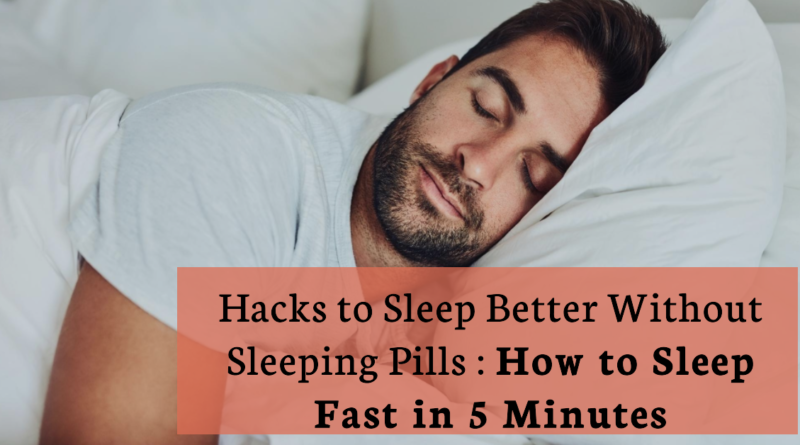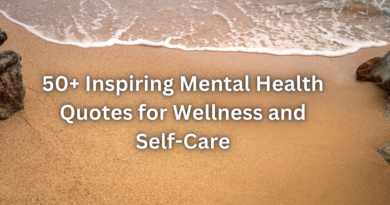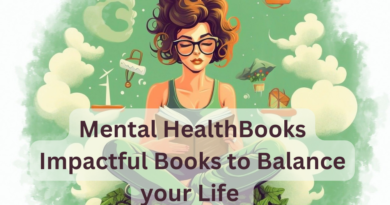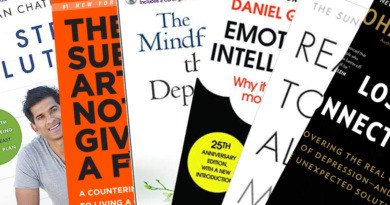Hacks to Sleep Better Without Sleeping Pills: How to Sleep Fast in 5 Minutes
Introduction
Sleep is a cornerstone of overall health, revitalizing our bodies and minds to face each day anew. Despite its importance, sleep often receives inadequate recognition, leaving many to grapple with restless nights. The repercussions of insufficient sleep extend far beyond mere fatigue, affecting our physical and mental well-being. Let’s delve into the critical role of sleep and uncover strategies for how to sleep fast, know the best sleeping positions, ideal sleep directions, as well as the best pillows.
Sleep’s Vital Role
Sleep is essential for physical health. During deep sleep, our bodies undergo vital repairs, tissue regeneration, muscle growth, and immune system reinforcement. Chronic sleep deprivation heightens the risk of chronic conditions like obesity, diabetes, cardiovascular diseases, and weakened immunity.
In the realm of mental health, sleep is equally crucial. It aids memory consolidation, emotion processing, and toxin removal in the brain. Insufficient sleep can lead to mood swings, heightened stress, anxiety, depression, and an elevated risk of mental health disorders.
Cognitive function thrives on adequate sleep. A well-rested mind excels in problem-solving, creativity, and decision-making, while sleep deficiency impairs productivity and daily tasks. Emotional well-being is also deeply intertwined with sleep, with adequate rest fostering emotional stability and stress resilience.
The Impact of Sleep Deprivation on Health
Chronic sleep deprivation has been linked to heightened stress levels. In fact, a study conducted by the American Psychological Association found that individuals who consistently slept less than the recommended 7-9 hours per night reported higher stress levels, with 45% reporting increased stress compared to those who got sufficient sleep.
Sleep deprivation, or consistently not getting enough sleep, can have profound and detrimental effects on our physical and mental health. Here, we’ll read in detail how the lack of sleep can negatively impact various aspects of our well-being, highlighting the keywords related to this critical topic.
- Weakened Immune System: Chronic sleep deprivation can compromise the immune system’s ability to defend the body against infections and illnesses. Reduced sleep can lead to a decrease in the production of immune cells and antibodies, making individuals more susceptible to viruses and bacterial infections.
- Weight Gain and Obesity: Sleep plays a crucial role in regulating appetite and metabolism. Sleep-deprived individuals often experience increased cravings for high-calorie, sugary foods, and their body’s ability to process carbohydrates may be impaired. These factors can contribute to weight gain and a higher risk of obesity. You can check out a few weight loss hacks without GYM or heavy workouts.
- Cardiovascular Problems: Insufficient sleep has been linked to a higher risk of heart disease and hypertension (high blood pressure). Sleep deprivation can result in increased stress on the cardiovascular system, leading to inflammation, arterial damage, and irregular heart rhythms.
- Diabetes: Sleep deprivation can impair the body’s ability to regulate blood sugar levels. This can contribute to insulin resistance and an increased risk of developing type 2 diabetes.
- Cognitive Impairment: Lack of sleep can lead to impaired cognitive function. Individuals may experience difficulty concentrating, memory problems, and reduced ability to make decisions. In extreme cases, severe sleep deprivation can lead to microsleep episodes, where the brain briefly shuts down without the person’s awareness, posing a danger in situations that require attention, such as driving.
- Mood Disorders: Sleep is closely tied to emotional well-being. Sleep-deprived individuals are at a higher risk of mood disorders, including depression and anxiety. Emotional regulation can become more challenging, and even minor stressors can feel overwhelming.
- Reduced Productivity and Performance: Sleep deprivation can significantly impact work and daily life. Reduced alertness, slower reaction times, and decreased productivity are common consequences. In the workplace, chronic sleep deprivation can lead to errors and accidents.
- Pain Sensitivity: Lack of sleep can heighten sensitivity to pain. It can exacerbate existing chronic pain conditions and make it more challenging to manage discomfort.
- Hormonal Imbalances: Sleep deprivation disrupts the balance of various hormones in the body, including cortisol (a stress hormone) and growth hormone. These imbalances can have widespread effects on physical health and well-being. If you’re interested in learning more about kegel exercises for hormone control and pelvic floor, you can read this informative article on Kegel Exercises and poses.
- Aging and Skin Health: Chronic sleep deprivation can accelerate the aging process, leading to the development of wrinkles, fine lines, and dull skin. This occurs due to the body’s reduced ability to repair and regenerate skin cells during sleep. Along with a good sleep it is better to fix the food you eat for glowing skin, include a fruit to your diet for healthy skin.
To safeguard our health and well-being, it is essential to prioritize and maintain a consistent sleep schedule that allows for adequate, restorative sleep.
Now that we comprehend the significance of sleep, let’s explore strategies for achieving restful nights without resorting to sleeping pills.
We’ll explore simple yet effective hacks that can help you fall asleep fast and quick, stay asleep, and wake up feeling rejuvenated.
Let’s uncover the secrets to better sleep and discover how to sleep fast in just 5 minutes.
- Simple Dinner: Avoid heavy, spicy, or large meals close to bedtime. Opt for a light, easily digestible dinner to prevent discomfort and indigestion that can disrupt your sleep.
- Better Lighting: Create a sleep-conducive environment by dimming the lights in your bedroom. This signals to your body that it’s time to wind down and prepare it for rest.
- Soothing Music: Gentle, calming music or nature sounds can help relax your mind and drown out any disruptive noises. Create a playlist of your favorite relaxing tunes to play before bedtime.
- Avoid Screens: The blue light emitted by smartphones, tablets, and computers can interfere with your body’s production of melatonin, a hormone that regulates sleep. Try to avoid screens at least an hour before bed.
- Comfortable Bedding and Clothing: Invest in a comfortable mattress and pillows that suit your sleeping preferences. Wear breathable, comfortable sleepwear to help regulate your body temperature during the night.
- Aromatherapy: Certain scents or essential oils like lavender, chamomile, and eucalyptus are known for their calming and sleep-inducing properties. Consider using essential oils or a diffuser in your bedroom to create a relaxing atmosphere.
- The Best Sleeping Position: Finding the right sleeping position is crucial for a good night’s sleep. While individual preferences vary, sleeping on your back with a supportive pillow for your neck and head is often recommended for spinal alignment and reduced risk of wrinkles.
- The best direction to sleep: While there’s no one-size-fits-all answer, some people find that sleeping with their head facing north (or south, depending on your location) enhances their sleep quality. Experiment with different directions to find what is the best direction to sleep fast for you.
- Choose the Right Pillow: The best pillow for sleeping is one that provides adequate support for your head and neck. Memory foam pillows, cervical pillows, or pillows with adjustable loft are popular choices for improving sleep quality.
Final Words on how to sleep fast in 5 minutes
A good night’s sleep is within your reach without the need for sleeping pills. By implementing these simple hacks and establishing a sleep-friendly routine, you can improve your sleep quality and wake up feeling refreshed.
Remember that quality sleep is essential for your overall health and well-being, so prioritize it in your daily life. Whether it’s choosing the best sleeping position, creating a serene sleep environment, or practicing relaxation techniques, these hacks can help you achieve the coveted goal of sleeping fast and sleeping well. Sweet dreams!




